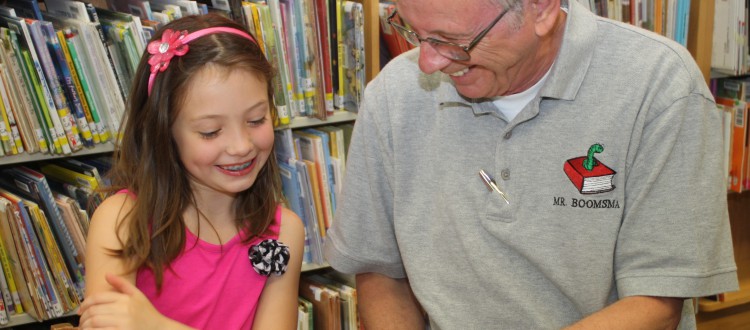Sponsor Spotlight: Walter Boomsma, Valley Grange #144
Enthusiasm is important to the success of any project, but it is not the only ingredient. Although enthusiasm is frequently the catalyst, the jump-start that gets the engine going, it is commitment that provides for the life and continuity of a dictionary project. Commitment, or the state of being whole-heartedly dedicated to a cause, is what has driven Walter Boomsma to continue The Dictionary Project for the Valley Grange #144 for the past eight years. “My passion is kids first, second and third,” said Boomsma and The Dictionary Project appreciates his efforts to ensure that today’s children have a bright future.
Get to know a little bit about Walter:
1. Where are you from? Where do you live now and how did you get here?
Born and raised in Western Massachusetts; “retired” to Maine a dozen years ago… chose Maine for its rural aspect and small town living.
2. What aspects of your hometown (or any domicile) have shaped you into the person you are today or left a lasting impression?
Growing up in a small town meant having a strong sense of community. I’m not sure I realized it at the time, but I had lots of resources available and people who cared for me, looked after me, and wanted to see me become a good and successful person.
3. What were you like as a student? Does this have any bearing on how you view education or why you started the project?
I may not always have been a great student, but I did enjoy learning. I was fortunate in high school to have teachers who took a personal interest in their students. They convinced me I was capable of more than I might have thought. They also made education relevant. Learning wasn’t just something you did for school or a grade. We learned to be better thinkers. I truly value that education because it lead me to realize educating is about awakening a desire in students. My philosophy of teaching includes the idea that I am a facilitator of learning and that my two biggest challenges are convincing my students they are capable of much and helping them become self-motivated.
4. How did you hear about The Dictionary Project?
From a member of our Grange who thought it was a great idea, but ultimately dumped it in my lap! I tell the story (and promote the Dictionary Project) in my book, “Small People—Big Brains.” Read Here
5. What motivates you to keep the project alive?
For one thing, the project has become a “rite of passage” in the schools where we have the program. Students in the lower grades look forward to third grade because that’s the year they are given a dictionary. But I think the real motivation is watching how the kids react when they are handed these books. They become so excited! That was the biggest surprise to me when I first took over the project; I expected much less. How can a dictionary compete with tablets, computer games, television? But there’s almost no contest… the kids go nuts discovering what’s inside and really appreciate the fact that they can continue to make those discoveries because the dictionary is theirs! A television newscaster once said following a report on our program, “There’s hope!”
6. What obstacles have you faced when implementing your project and how did you overcome them?
I hesitate to call it an obstacle, but one important aspect of our project is that we truly attempt to partner with the schools and teachers. (This has probably contributed to the project becoming a rite of passage.) We have involved the teachers in the selection of the dictionary and we try to make the presentation itself a genuine learning experience, tying it to what teachers are trying to accomplish. A minor obstacle surfaces when involving other members in the presentation… some adults simply do not naturally relate well to kids and have difficulty “getting down” to the grade level. The kids, however, are very forgiving!
7. Where would you like to see your project next year, over 5 years, etc.? Do you have any long-term goals for the project?
Geographically, we’ve expanded the project about as far as practical. One goal/objective we’ve had is to become more than a provider of dictionaries—we truly want to be a resource to our schools. As such, we’ve developed several other projects and programs to that end, focusing primarily on elementary school and literacy. We have, for example, volunteer bookworms who go to school to read with kids in our local district. We sponsor a “Newspapers in Education” contest with the kids (third and fourth grade) drawing ads for Valley Grange—many of the entries emphasize the dictionary project. We have volunteer knitters who make hats and mittens for kids who need them. A long term goal is to utilize the dictionary project as a catalyst for building relationships with the schools and students—creating more community involvement with our schools.
8. From your life experience, what advice would you give a grade school student?
Dream and believe in those dreams. Spend a lot of time asking yourself “What if” and don’t immediately think “can’t.” Playing and pretending are great ways to learn! Don’t underestimate yourself and remember that you haven’t failed until you have given up.
9. Favorite book:
I usually answer this, “The one I am reading!” or “I don’t know yet.” While I believe in the value of re-reading books, I also think reading is a quest and I won’t be disappointed if my life ends before I discover my favorite book. There are lots to pick from!
10. Favorite Quote:
“It is easier to build strong children than to repair broken men.” Frederick Douglass, 1818 – 1895
Walter Boomsma and the work he does to promote literacy in his community was recently featured in the Maine Seniors Magazine. Read the Full Article.






